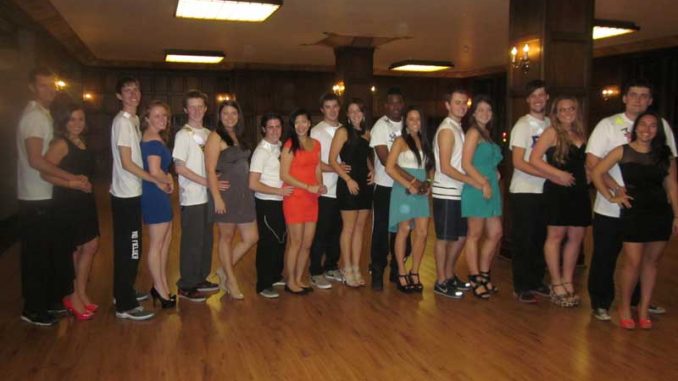

They can be found on Liacouras Walk and by the Bell Tower on any given day — students donning lettered T-shirts, rattling change-filled containers and calling for donations to breast cancer research and domestic violence awareness.
Yes, those ubiquitous Greeks.
It’s not all can shakes and bake sales, though. President of the Interfraternity Council and Phi Kappa Theta member Kevin Bargeron said philanthropy is among the four pillars of Greek life, which also includes scholarship, brotherhood and leadership.
“The primary reason that Greek organizations exist is brotherhood and sisterhood, but the second is philanthropy,” Bargeron said.
Temple boasts more than 1,000 students involved in Greek life throughout 36 registered organizations on Main Campus. Among these are the four sororities that make up the Panhellenic Association and the 10 fraternities that form the Interfraternity Council. There are also six Multicultural Greek Council fraternities, eight Multicultural Greek Council sororities, four National Pan-Hellenic Council fraternities and three National Pan-Hellenic Council sororities. Each group employs the four pillars and, in turn, is involved with service.
Every Greek chapter on campus officially supports at least one health or social problem by raising money and awareness through events and activities.
Delta Phi Epsilon holds a minimum of two major events each school year to benefit its chosen causes. In the fall, it hosts “Deepher Dude” to raise money for cystic fibrosis research.
“It’s basically a male beauty pageant,” said Courtney Bradley, vice president of programming and a senior tourism and hospitality major. “Each of the fraternities in the IFC picks one guy to participate. There’s swimwear, formalwear, a talent portion and a Q&A. We sell tickets and raise money during the show, and all of the proceeds go to the Cystic Fibrosis Foundation.”
This year Delta Phi Epsilon raised approximately $8,700 for the CFF.
In February, Delta Phi Epsilon also holds its “ANAD Week” in support of the National Association of Anorexia Nervosa and Associated Disorders.
Fraternities and sororities do not limit themselves to supporting one or two causes. Alpha Epsilon Phi requires its members to participate in Initiative Hour during which members can volunteer anywhere in the community. Many choose to visit the Inglis House to assist adults with physical disabilities.
The minimum service quota for each Greek organization to receive accreditation from Temple is five hours for each member.
“We far exceed that,” said Bargeron, a senior philosophy and pre-law major.
Collectively, the groups log thousands of volunteer hours per semester.
For many prospective recruits, Greek organizations’ involvement with service is an incentive to join.
“When I went out for recruitment, I really wanted to get involved with philanthropy,” said Erika Marchiondo, a junior marketing major and member of Alpha Epsilon Phi. “Like the AIDS Walk that we do, it means so much more to [those who benefit from it] than a walk. It’s such a great cause.”
“I joined the organization because I didn’t feel connected to anything at Temple, and when I learned more about what the organization was and what we stood for, that’s why I stayed,” Bargeron said.
Bargeron estimates that students may be as much as 60 percent more inclined to join a fraternity or sorority because of the service aspect it offers.
“It’s good to give back. A large group of people can have a lot of power with these philanthropies,” Kristen Hartman, Alpha Epsilon Phi’s vice president of philanthropy and senior therapeutic recreation major, said.
Hartman said community service can be difficult for people to initiate on their own, but that by making it a requirement for all members, a certain amount of social anxiety can be removed.
But the power of those can shakes should not be underestimated. Hartman said they often raise hundreds of dollars, all of which goes directly to their respective charities.
The Temple University Greek Association serves as the governing body for all Greek organizations on campus by creating programming and supporting the development of each individual organization. It organizes events such as Greek Week and Greek 101, which teaches new members the intricacies of Greek life at Temple.
“This year, under TUGA’s guidance, Greek groups are putting an emphasis on serving the local community,” Cori Shearer, TUGA president and Delta Phi Epsilon member, said. “This means they will be participating in trash cleanups, block parties and a Halloween trick-or-treat on campus for kids who live in nearby neighborhoods.”
Shearer, a junior public relations and management information systems double major, said all students are invited to participate in Greek-organized service activities.
“If you see us canning, donate,” Shearer said. “We had 40 new students working at [a Greek-sponsored event] during FreshServe. I think that a lot of people don’t realize how involved we are.”
Shearer added students are also welcome to visit TUGA’s office in the Student Center Village, where all the student organizations are, with questions or concerns about Greek life.
Julie Zeglen can be reached at julie.zeglen@temple.edu.


Be the first to comment